- Home
- J. Robert Kennedy
Forgotten Page 4
Forgotten Read online
Page 4
He pressed the button for the elevator and turned to her. “How’d the broadcast go?”
She shrugged. “Good, I guess. I didn’t mess up any of my lines, so that’s always good.”
He chuckled then held out his hand as the doors opened. She stepped inside and he followed, pressing the button for the lobby. “Did you drive?”
She shook her head. “No, company driver.”
“Must be nice.”
She grinned. “Yup.” Then frowned. “Oh shit!” She fired a text to her driver, letting him know he could go home. Her phone vibrated a few moments later.
Okay thanks. Usual time tomorrow?
She swiped her thumb, selecting “Yes”. She returned her attention to Shakespeare. “How was your day?”
He grunted. “Same old, same old. New Yorkers killing each other, me trying to figure out the who, what, when, where, why of it.”
She grinned. “Just like a reporter!”
He gave her a look. “Umm, I like to think you’re trying to emulate us.”
“Touché. So, where do you want to go?”
He shrugged. “I know a place that’s got great apple pie.”
She wagged a finger at him. “You’re a diabetic. You shouldn’t be eating that stuff.”
He dismissed her observation with a toss of his head and roll of the eyes. “Whatever. I’m going to live my life and take a few more units of insulin when I need it.”
Her chest tightened, previous conversations suggesting he was having trouble with the lifesaving medicine. “How’s that going?”
He smacked his stomach. “It’s going right here. It’s causing me to gain weight like crazy. I hate the shit.”
“But it’s keeping you alive.”
“Yeah, but for what purpose. I was already miserable. Imagine how miserable I’ll be when I hit three-hundred pounds. And do you think the force will let me stay on?” He sighed and she looked at him, the pain he was going through obvious.
“What are you going to do?”
He frowned. “I don’t know. I’m thinking of just stopping the insulin altogether so I can at least stabilize my weight.”
“But what about your blood sugars?”
He shrugged. “I guess it’ll kill me eventually, but at least I’ll die happy.”
She took his arm and wrapped herself around it, laying her head on his shoulder. “You know I hate it when you talk about dying. You’re too young.”
He grunted. “You’re too young. Me, I had my midlife crisis so long ago, I can’t remember it because of my old-timer’s disease.”
She giggled. “You’re not that old, old man.”
The elevator chimed and the doors opened. Shakespeare held the door and she stepped into the lobby. A man emerged from the shadows, young, perhaps a few years younger than her, his desperation obvious.
“Uh oh.”
Shakespeare looked at her. “What?”
“Miss Kai?”
“Do you know him?”
“No.”
The security guard rounded the desk. “I’m sorry, Miss Kai. He refused to leave. I’ve already called for backup.”
The man blocked their path, Shakespeare putting himself between her and the unwelcome guest. He leaned to the side, trying to see past the rotund detective.
“Miss Kai, you don’t know me. My name is Robert—ah Bobby—Todd. My sister was abducted by ISIS a few days ago and I need your help.”
Shakespeare leaned, blocking her view of him. “Call Homeland Security.”
“We have, and they won’t do anything about it.”
“Why not?”
“Because she went voluntarily, and she’s nobody.”
That last word piqued Aynslee’s conscience.
“We don’t have any money, no connections, nobody we can try to convince to help her.” He leaned back into sight. “Miss Kai, we need you. We need the press.”
She placed a hand on Shakespeare’s shoulder, rounding the big man. “Why me?”
Shakespeare tossed her a glance, clearly displeased with her decision to engage.
“Because you’re known. People like you, and they trust you. If you start asking questions, you’ll get answers, and then maybe somebody will do something to save my sister.” He shoved a thick manila envelope toward her. “Here, this is everything we know. I managed to figure out her password and print a bunch of stuff. Please, just look at it and call me if you think there’s a story here.”
Shakespeare looked at her and she nodded. He grunted his continued displeasure but took the envelope, peering inside before handing it over.
“Thank you, Miss Kai, thank you both.”
Several security guards emerged from an elevator, rushing toward them. Bobby’s eyes bulged. “Umm, I’ll go now.”
Shakespeare stepped toward him. “You do that.”
Bobby rushed toward the revolving doors then disappeared into the night, Aynslee resisting the urge to open the envelope right there.
“Are you okay, Miss Kai?”
Aynslee waved off the guards. “Yes, we’re fine, thank you.”
“Okay, you have a good night, ma’am.”
Aynslee nodded, still distracted, too distracted to reply to the “ma’am” reference. Shakespeare turned to her.
“Pie?”
“I thought it was coffee.”
“Pie and coffee.”
“I shouldn’t have any coffee, I’ll be up all night.”
“Then just pie.”
“You’re terrible!”
Shakespeare grinned. “I know, haven’t you heard?”
12 |
ISIS Held Territory Kobani, Syria
Mary Todd rubbed her eyes, the overwhelming stench of the warehouse she was in now going unnoticed, her olfactory senses numbed by the constant onslaught of dozens of women in cramped quarters with nothing but a couple of buckets in a corner acting as their washroom facility.
It was, frankly, disgusting.
She had managed to hold in any bowel movement, though had been forced to pee several times in the past few days, days in which she had discovered little. The doors were locked and there were no windows, the only light provided by three bare bulbs hanging from the ceiling. They were left alone unless there was a new arrival, which was fairly frequently, and they seemed much like her.
Girls, terrified.
What had surprised her was how many of the girls around her spoke anything but Arabic. She had identified English, French, German, and Spanish in the short time she’d been here, braving a few brief conversations with the others near her. One side of the room seemed to be Muslims, or at least Arabic speakers, the other side, her side, foreigners like her.
June, a Brit that had given her the rundown on how things worked, had said they were mostly Yazidis. She had never heard of them before, but they were Muslim, though most Muslims apparently hated them for some reason. She didn’t know why, and neither did her new friend. Yet what she did know was that most of the Westerners in the room were like her. Converts to Islam, all arriving here thinking they’d be joining boyfriends they had met online, or to reunite with friends already here—like herself—to help the cause.
The restoration of the Caliphate, and the eventual creation of the Worldwide Caliphate, where Islam would rule the entire world, religious hatred a thing of the past, life simple once again.
The pressures and temptations of the corrupt Western civilization she had been born into would be gone. There would be no worrying about boys, about homework, about college, about politics. No red states and blue states, churches and synagogues, no criticisms over what football team you had to cheer for because the family had always cheered for that team, no struggling to have the latest of everything, and feeling like a failure because you didn’t.
Life would be simple.
Allah would dictate what you needed.
And as a woman, she’d be a wife. Her husband would tell her what she had to do, and there’d be none o
f the soul-crushing burdens young Western women experienced every day. The decisions would be taken out of her hands.
It sounded fantastic to her.
And all that was expected of her was to be a good wife, a good mother, and a good Muslim. Muslim or Christian didn’t matter to her. It was all the same god. It was the order and absolute adherence to scripture that attracted her. Hearing her Muslim friends at high school and then college talking about it, had piqued her curiosity enough to start her own research. With her family devout Christians, she had done it in secret, her friends eager to help, not pressuring her, simply answering any questions she might have, and sending her links to websites and videos that explained the wonders of Islam, and how God’s teachings had become corrupted by the Western lifestyle.
The funny thing was that it was her father that had convinced her Islam was the way, and not the path of Westernized Christianity. She had watched him struggle her entire life, never getting ahead, barely keeping food on the table and a roof over their heads. She had heard him crying sometimes behind the closed door of his den, the only sanctuary he had from the pressures of the modern world.
And she wondered what their lives would be like if money and brains weren’t what were valued, but a devout adherence to one’s beliefs, and a willingness to work hard with the tools Allah had provided.
Her father was a hard worker, of that there was no doubt, but he wasn’t tech-savvy, nor would he ever be. And today, most good jobs required it. He was too old to learn new things, or so he claimed, and too tired even if he could.
But in the Caliphate, his work ethic would be valued, and when everyone provided for each other, life would no longer be a struggle. If no one had televisions or computers, then there’d be no need to find the money to pay for them. If everyone worked the land and reaped the rewards of a simple, pious life, men like her father would thrive, and women like her along with them.
But it was all a lie.
At least what was promised her was a lie.
The vision was grand, and she had no doubt would one day be achieved through simple demographics alone, though for her, the individual, today, she now knew it wasn’t to be.
It wasn’t to be for any of them in this room.
There was a rap on the door, silencing the room and her thoughts. The door swung open, two men with machine guns stepping inside. They surveyed the room and she coughed, rolling her shoulders forward, making herself appear as sickly as possible, June and several others doing the same.
“You and you!”
Two girls cried, one she was sure was barely twelve. They were hauled to their feet, kicking and screaming, then led from the room. The door slammed shut, silencing their cries, and she knew from what had happened since she’d been here, they would not be coming back. What she didn’t know was whether these two poor souls were to be killed, or to be sold into a life of slavery, where they wished they were mercifully so.
13 |
Katz’s Delicatessen New York City, New York
“Two of the largest slices of apple pie you’ve got.”
Aynslee Kai gave Shakespeare a look. “Make mine the smallest.”
Shakespeare rolled his eyes, winking at the waitress. “TV people, whatcha gonna do?”
The waitress regarded Aynslee. “Honey, whatever you’re doing, keep doing it. I’d slaughter small villages to have a figure like yours.”
Aynslee blushed. “Umm, thanks,” she murmured.
“Oh, slap a slice of cheddar on mine for me, would ya, darlin’?”
“No problem, Detective. Comin’ right up.”
The waitress wiggled away, her generous hips swaying, the display for Shakespeare’s benefit lost on Aynslee as she opened the manila envelope handed her by Bobby Todd. She pulled out a sheaf of papers then tipped the envelope, a memory stick clattering onto the table.
“So, anything interesting?” Aynslee pushed the pages toward him as she finished scanning each one, Shakespeare losing focus when the waitress held up a slice of pie for his approval. He gave the thumbs up as if he had chosen his lobster. He returned his attention to the papers. “Anything?”
“Just printouts of her browsing history, copies of their plane tickets and contact info. I think there’s little doubt Mary Todd and her brother did travel to Turkey. If we believe him, then they were met at the border with Syria.”
“Why would anybody be so stupid?”
Aynslee flicked the paper she was holding. “He’s included a summary. Apparently, two of her friends went there a few months ago and then they lost contact. She was concerned, so she wanted to go find them.”
“Idiot.”
“But the brother doesn’t think that’s true anymore.”
Shakespeare leaned forward. “Why?”
“They found a Koran in her bedroom and a lot of literature and websites that suggest she had converted to Islam and was going over there to join her friends, not rescue them.”
Shakespeare leaned back, a burst of air erupting from between his lips. “My God, don’t these kids read the news? Who in their right mind would want to convert to that religion to join a bunch of butchers?”
“Misguided youth, I guess.” Aynslee frowned, continuing to read. “The brother thinks it was her plan all along to go and join her friends and join the cause.”
Shakespeare grunted. “And why does he think you can do anything about it?”
“Apparently the government won’t help. She’s an adult, went there willingly, and I guess it’s her own damned problem.”
Shakespeare shrugged. “I tend to agree. If she were kidnapped and taken there, sure, but she’s a private citizen who intentionally went there and joined. And we don’t even know if she’s having any regrets about her decision. For all we know, she could be over there, as happy as a pig in—”
“Here you go!”
Two slices of pie were placed in front of them, Aynslee’s entirely too big for her liking, though half the size of Shakespeare’s. Two black coffees were added and Aynslee held out a finger. “Decaf?”
“Yes, dear, I didn’t forget.”
Aynslee smiled. “Thanks!”
Shakespeare attacked his piece, cutting off a large morsel with the edge of his fork then shoveling it in his mouth. He leaned back and savored every chew, groaning. He swallowed. “I told you they had the best pie.”
Aynslee’s eyes narrowed as she read the emails exchanged between Mary Todd and her friends, her pie going unnoticed.
“Better start eating. If I finish mine first, I just might take yours.”
She grunted.
Shakespeare put down his fork, wiping his mouth with a napkin. “What is it?”
“This name. Alia Monroe. It sounds familiar.”
“Never heard of her.”
She pulled out her phone and quickly Googled the name. Her eyes widened. She pushed her phone toward Shakespeare. “If it’s the same Alia Monroe, she’s the President’s cousin.” Shakespeare’s eyebrows shot up as he read the article off her phone, Aynslee summarizing. “She’s been missing for three months and no one knows where she went.”
His eyebrows rose even further. “Jesus, do you think anyone at State knows she’s sitting in Syria, servicing the soldiers of Allah?”
“Justin!”
Shakespeare blushed. “Sorry, but, well, you know it’s the truth.”
She sighed, nodding her head slowly. “I’ve done enough reporting over the past few years to know you’re probably right. It’s just horrible to think about.” Shakespeare handed her phone back. She ran a few more searches, trying to find any reference to her having converted to Islam, instead discovering she was Muslim from birth.
Shakespeare returned to his pie. “So, does this make it a story?”
“It certainly does, but only if I can confirm it’s the same girl, and only if I can somehow prove she’s over there.”
Shakespeare swallowed another bite, his cheese half eaten. “Shoulda got à la mode i
nstead of the cheese.”
Aynslee had some fun with him. “Why not both?”
His eyes widened slightly at the idea. He glanced over at the counter but their waitress was busy, chatting with one of the few other customers here at this time. He grunted, returning his attention to his original selection sitting in front of him. “I know a guy at Interpol who might be able to tell us. This isn’t my jurisdiction, so there’s nothing I can really do without getting myself in more hot water than I’m usually in, but he might be able to run some checks for you.”
Aynslee glanced up from the page she was reading. “Who?”
“Just some guy I helped out on a case about a year ago.”
14 |
Hugh Reading Residence Whitehall, London, England
Interpol Agent Hugh Reading flushed the toilet then burped, patting his stomach, it protruding slightly more than a few hours ago, the gentle warmth of a few pints of lager and lime shared with his son, leaving him in a genuinely good mood. This was the first night of a week-long vacation, tomorrow’s agenda having him meet James Acton and Laura Palmer in Mexico for a holiday, the uber-rich couple, and two of his best friends, paying his way. He never ceased to feel guilty about it, though he had managed to work them down to a coach seat instead of her private jet, which made him feel a bit better.
Or at least it had until he began his online check-in and discovered the bastards had upgraded him to first class.
At least he hadn’t asked, and as he had explained it to himself before, a plane ticket for them was like a coffee for him, and he wouldn’t hesitate to buy them a coffee.
Though not one of those new Starbucks creations. Twenty-plus quid for a coffee was insane on any budget, and was proof Western civilization was collapsing, the excesses of Ancient Rome now permeating today’s culture—exotic wines replaced with ridiculously overpriced coffee, gladiator matches replaced with Mixed Martial Arts, fake refugees and economic migrants the new barbarian hordes.
You’ll be dead soon enough.

_preview.jpg) The Protocol (A James Acton Thriller, Book #1)
The Protocol (A James Acton Thriller, Book #1)_preview.jpg) Depraved Difference (A Detective Shakespeare Mystery, Book #1)
Depraved Difference (A Detective Shakespeare Mystery, Book #1) Atlantis Lost
Atlantis Lost The Tomb of Genghis Khan
The Tomb of Genghis Khan_preview.jpg) Rogue Operator (A Special Agent Dylan Kane Thriller, Book #1)
Rogue Operator (A Special Agent Dylan Kane Thriller, Book #1)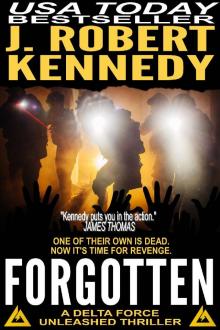 Forgotten
Forgotten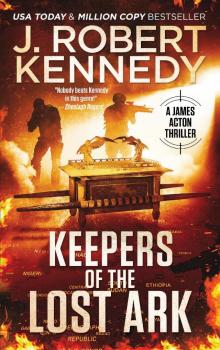 Keepers of the Lost Ark
Keepers of the Lost Ark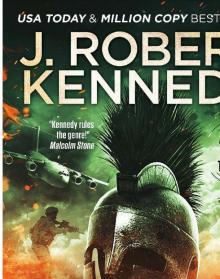 The Cylon Curse
The Cylon Curse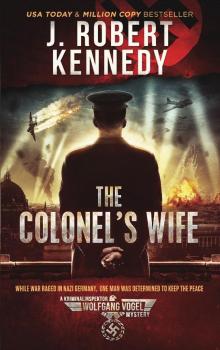 The Colonel's Wife
The Colonel's Wife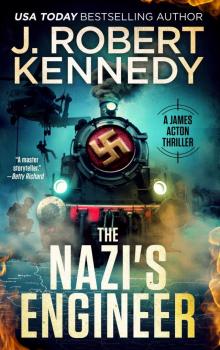 The Nazi's Engineer
The Nazi's Engineer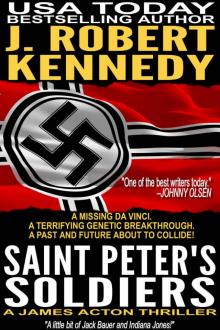 Saint Peter's Soldiers (A James Acton Thriller, Book #14)
Saint Peter's Soldiers (A James Acton Thriller, Book #14)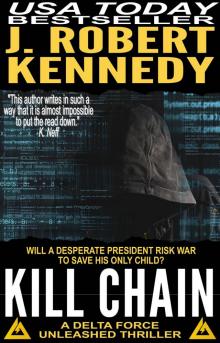 Kill Chain
Kill Chain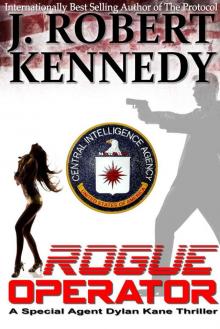 Rogue Operator
Rogue Operator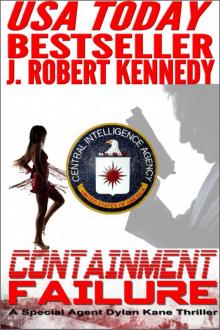 Containment Failure (A Special Agent Dylan Kane Thriller, Book #2)
Containment Failure (A Special Agent Dylan Kane Thriller, Book #2) The Lazarus Moment
The Lazarus Moment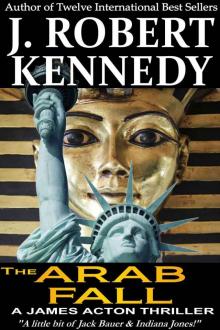 The Arab Fall (A James Acton Thriller, Book #6) (James Acton Thrillers)
The Arab Fall (A James Acton Thriller, Book #6) (James Acton Thrillers) Payback
Payback Flags of Sin - 05
Flags of Sin - 05 The Viking Deception
The Viking Deception The Templar's Revenge (A James Acton Thriller, #19) (James Acton Thrillers)
The Templar's Revenge (A James Acton Thriller, #19) (James Acton Thrillers)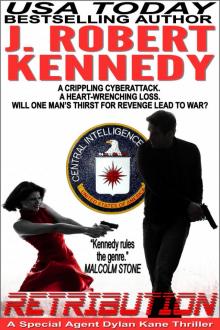 Retribution - A Special Agent Dylan Kane Thriller Book #7
Retribution - A Special Agent Dylan Kane Thriller Book #7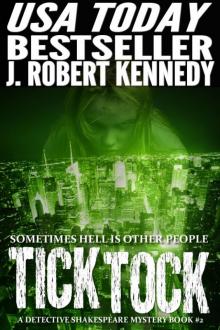 Tick Tock (A Detective Shakespeare Mystery, Book #2)
Tick Tock (A Detective Shakespeare Mystery, Book #2) Blood Relics (A James Acton Thriller, #12)
Blood Relics (A James Acton Thriller, #12)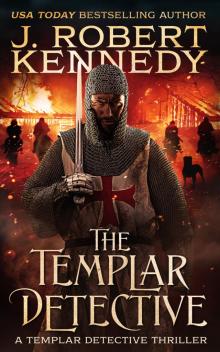 The Templar Detective
The Templar Detective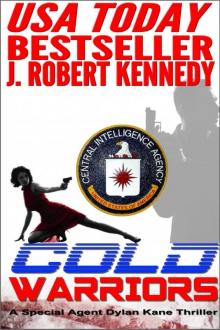 Cold Warriors (A Special Agent Dylan Kane Thriller, Book #3)
Cold Warriors (A Special Agent Dylan Kane Thriller, Book #3)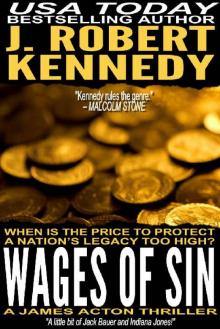 Wages of Sin (A James Acton Thriller, #17) (James Acton Thrillers)
Wages of Sin (A James Acton Thriller, #17) (James Acton Thrillers)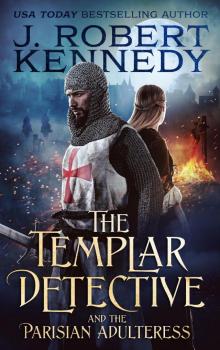 The Templar Detective and the Parisian Adulteress
The Templar Detective and the Parisian Adulteress Pompeii's Ghosts (A James Acton Thriller, #9)
Pompeii's Ghosts (A James Acton Thriller, #9) Raging Sun (A James Acton Thriller, #16) (James Acton Thrillers)
Raging Sun (A James Acton Thriller, #16) (James Acton Thrillers) The Riddle (A James Acton Thriller, Book #11)
The Riddle (A James Acton Thriller, Book #11)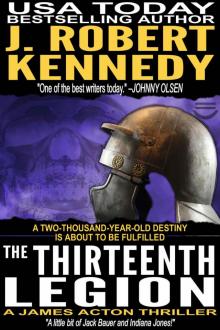 The Thirteenth Legion (A James Acton Thriller, #15) (James Acton Thrillers)
The Thirteenth Legion (A James Acton Thriller, #15) (James Acton Thrillers) Wrath of the Gods (A James Acton Thriller, #18) (James Acton Thrillers)
Wrath of the Gods (A James Acton Thriller, #18) (James Acton Thrillers) Sins of the Titanic (A James Acton Thriller, #13)
Sins of the Titanic (A James Acton Thriller, #13) Amazon Burning (A James Acton Thriller, #10)
Amazon Burning (A James Acton Thriller, #10)